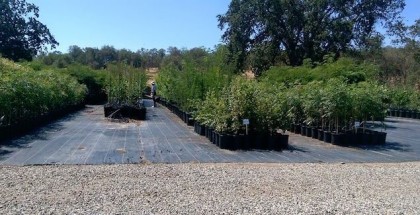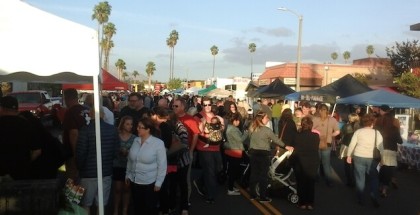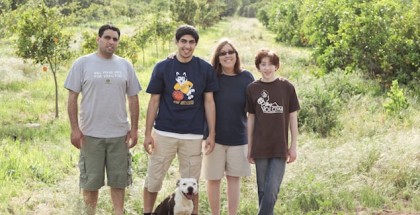Posts By AJ Hughes
Coalition Fights Food Waste to End Hunger in Orange County, CA
January 9, 2017 | AJ HughesWhen Santa Ana, California pediatrician and Orange County Public Health Officer Eric Handler ran into Mark Lowry of the Orange County Food Bank some years ago, he had two questions for him:
- Do you have enough food in your food bank?
- If we captured all food waste, could we end hunger in Orange County?
Lowry’s answer to the first question was no, and his answer to the second question was yes. This interaction led to the formation of the Waste Not OC Coalition in 2012.
With an overarching goal to eradicate hunger in Orange County, the Waste Not OC Coalition recovers food by connecting restaurants and grocery stores with food recovery agencies. It distributes that food by connecting people in need with food pantries. It also educates donors, recipients and the general public about the importance of food donation and how to safely handle donated food. Read More
Four Inland Empire Community Garden Programs Working to Make a Difference
June 30, 2016 | AJ Hughes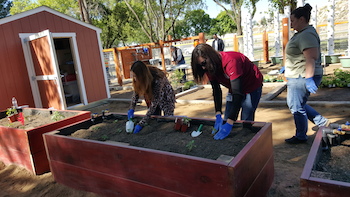
The City of Perris’s Green City Farm. Photo courtesy of the City of Perris.
Community-based agriculture is increasing across the Inland Empire(IE) as more community gardens and the programs related to them are being established. As outlined below, these efforts include many new farm plots where residents are growing their own food, learning new skills and gaining food system awareness. But the people establishing these gardens are going further than just turning bare dirt into growing grounds. They are implementing ancillary programs as well, thereby adding even greater value to their communities. Each of these various enterprises benefits their local cities and neighborhoods by increasing access to healthy and fresh foods, as well as providing employment, educational opportunities and a greater sense of community to everyone involved in their construction, day-to-day upkeep and expansion.
Incredible Edible Community Garden – Upland
A few years ago, Mary Petit and Eleanor Torres decided to tackle the problem of food insecurity in their local Upland area by working at a local community garden. Petit looked for an existing community garden with no success, so she and Torres began their own and named it the Incredible Edible Community Garden. Read More
6 Riverside County Farms Strengthening the Local Food System
June 13, 2016 | AJ Hughes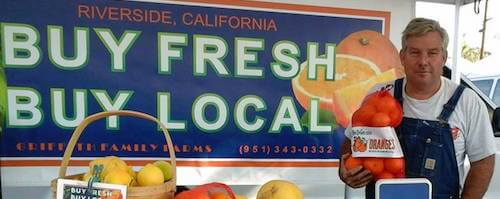
Brian Griffith of Griffith Family Farm in Riverside, CA. Photo courtesy of Brian Griffith.
Riverside County, and the City of Riverside in particular, possesses a rich agricultural heritage dating back to the 19th century. However, in the 20th century as population growth fueled by families in search of affordable housing led to increased residential, industrial and commercial development the county’s agricultural roots, and production, began to fray. Lately, though, there has been a renaissance of sorts as local farmers strive to meet growing demand from local consumers. The GrowRIVERSIDE movement, through conferences and community-building efforts, has also helped to build awareness and interest in local food among Riversiders.
Below is a list of six Riverside County farms that produce a wide array of products for the local market ranging from oranges, goat’s milk and pastured lamb to value-added goods such as soaps and lotions. Read More
The Farmers Come out at Night in Riverside
June 7, 2016 | AJ Hughes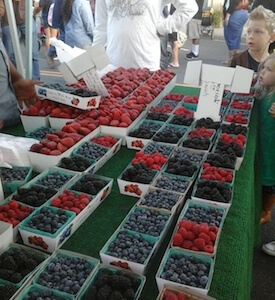
The Magnolia Center Marketplace, Riverside’s first nighttime farmers’ market in more than 10 years, celebrated its grand opening on May 20. (photo courtesy Kathi Foster)
If you can’t grab your locally grown, farm fresh Riverside produce during normal daytime hours, don’t fret. There’s a new market in town, and it’s open after hours.
This new night market, Magnolia Center Marketplace, is the brainchild of Rico and Rheiana Alderette, owners of downtown Riverside-based MADE, which sells furniture, vintage and handcrafted goods. MADE sponsors the market, which in addition to hosting a certified farmers’ market also features artisan and craft vendors.
“A Friday night market is great for both consumers and farmers,” says Rico Alderette.
Kathi Foster, produce manager for the Friday evening (and morning) Riverside Certified Farmers’ Market, agrees.
“Some people wanted a non-morning market,” she says. “It’s easier for some customers.” Read More
For Riverside, CA Food Co-op ‘Local is Micro-local’
May 31, 2016 | AJ Hughes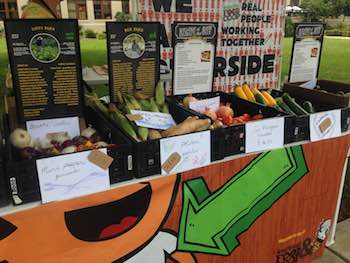
Al Centro mini produce stand, operated by the Riverside Food Co-op, provides locally-grown fruits and vegetables to Riverside residents. (photo courtesy Alannah Leblanc/Riverside Food Co-op)
The most important word for the Riverside Food Co-op (RFC) is “local.” Its definition can be broad, but for Nick Melquiades, RFC core team operations manager, “local” has a very specific meaning.
“For us, local is micro-local,” Melquiades says. “Ninety-five percent of our produce comes from within 25 miles of downtown Riverside.”
The RFC formed in 2011 in response to the recession in Riverside, has eventual plans to open a store. Not having a physical retail location to sell local produce, however, has not prevented it from playing an outsize role in local food system development in the City of Riverside. Read More
Despite Current Dysfunction in the Food System, Renowned Agroecology Expert Holds Out Hope for Future
May 10, 2016 | AJ Hughes
Stephen R. Gliessman, Alfred E. Heller Professor of Agroecology in UC Santa Cruz’s Environmental Studies Department, shares his thoughts regarding the state of the food system. Photo courtesy University of California, Santa Cruz
What is the state of the nation’s food system? Is it fundamentally broken and beyond repair? Does it need to be changed, and if so, how? What is it doing right?
To address these questions, we reached out to Stephen R. Gliessman, an internationally recognized leader in the field of agroecology, and the Alfred E. Heller Professor of Agroecology in UC Santa Cruz’s Environmental Studies Department, where he has taught since 1981. He was the founding director of the UCSC Agroecology Program (now the Center for Agroecology and Sustainable Food Systems) and is the author of the renowned and pioneering textbook Agroecology: The Ecology of Sustainable Food Systems. In 2008, Gliessman became the chief editor of the internationally known Journal of Sustainable Agriculture.
Here is what we learned:
What is the state of the food system?
The current state of the food system is unhealthy. There is too much emphasis put on the business of growing food rather than long-term stewardship, care for the earth, and the people who grow food. That, I think, is a more important part of what’s going on. It’s amazing what the current food system is able to produce in terms of calories, but it’s also amazing in terms of what it doesn’t produce in terms of healthy nutritious food. Read More
Former Dude Ranch Near Lake Elsinore Finds Success as Sustainable Pastured Lamb and Poultry Farm
April 28, 2016 | AJ Hughes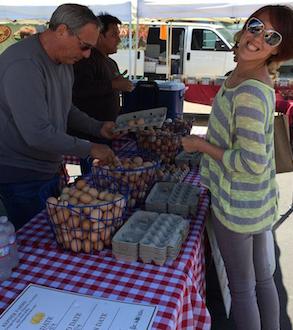
Kepner Farms sells eggs at the Manhattan Beach farmers’ market. (photo courtesy Carl Kepner/Kepner Farms)
Near Lake Elsinore, California, a former dude ranch is now home to pastured lamb and poultry.
Its transformation began when Carl Kepner inherited the land in 2010 and began Kepner Farms. It took some trial and error, however, for the business to arrive at its current incarnation.
Kepner started with aquaponics, and by 2012 was selling agricultural products. But he did not like the overall performance he was getting through his aquaponics operation, and switched over to traditional planting.
“I like soil better,” he says.
But realizing that growing fruits and vegetables was too labor-intensive for his liking and wanting to make permaculture a central theme of his operation, Kepner decided to raise pastured lambs and chickens. Now, Kepner Farms features 2,000 chickens and 250 head of sheep and lambs. Read More
Diversification, Organic Growing, and Savvy Enable Riverside Family to Save Farm and Prosper
April 20, 2016 | AJ Hughes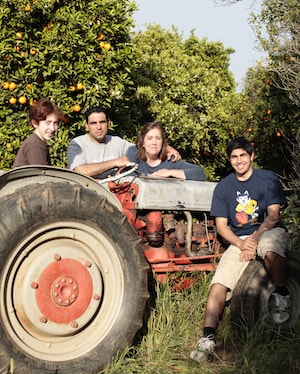
Hassan and Deborah Ghamlouch, along with their two sons, Zachary and Jacob, run The Grove, an organic family farm in Riverside, CA. (photo courtesy Hassan Ghamlouch/The Grove)
The Grove, a diversified and certified-organic family farm in Riverside, CA used to grow only citrus fruit and avocados. But in order to survive a changing market, it has diversified to include a wide array of organic produce.
Hassan Ghamlouch and his wife, Deborah, have operated The Grove for more than 13 years. Their sons Zachary and Jacob are also key contributors to the operation.
The farm has been in the family for four generations, dating back to the late nineteenth century when it primarily produced navel oranges. When Deborah’s parents wanted to sell the farm in the early 2000s, she and Hassan decided to purchase it and take over. They based their decision partly on the fact that The Grove’s orange trees are part of the original rootstock planted well over 100 years ago.
But Hassan and Deborah knew that if they wanted to keep the farm in their family, drastic changes were inevitable and necessary. Read More


